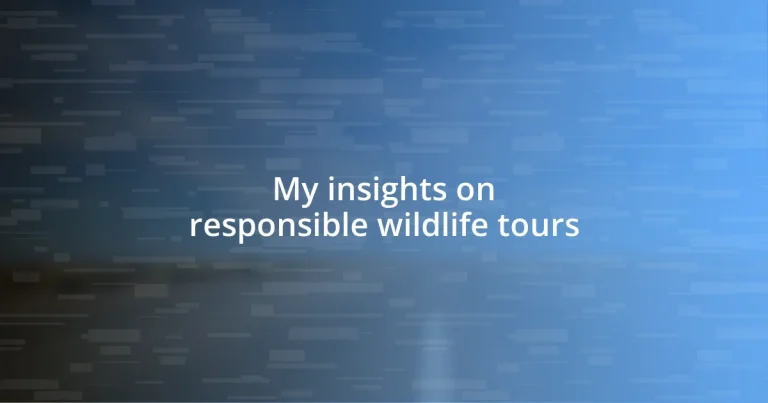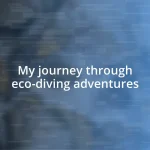Key takeaways:
- Responsible wildlife tours focus on minimizing human impact, supporting local communities, and ensuring animal welfare to enhance both conservation and traveler experience.
- Wildlife conservation is vital for biodiversity and ecosystem health, with a direct link to climate resilience and the survival of both animal species and human populations.
- Travelers can contribute to sustainability by choosing ethical tour operators, respecting wildlife, adhering to “leave no trace” principles, and reflecting on their experiences to foster a commitment to conservation.
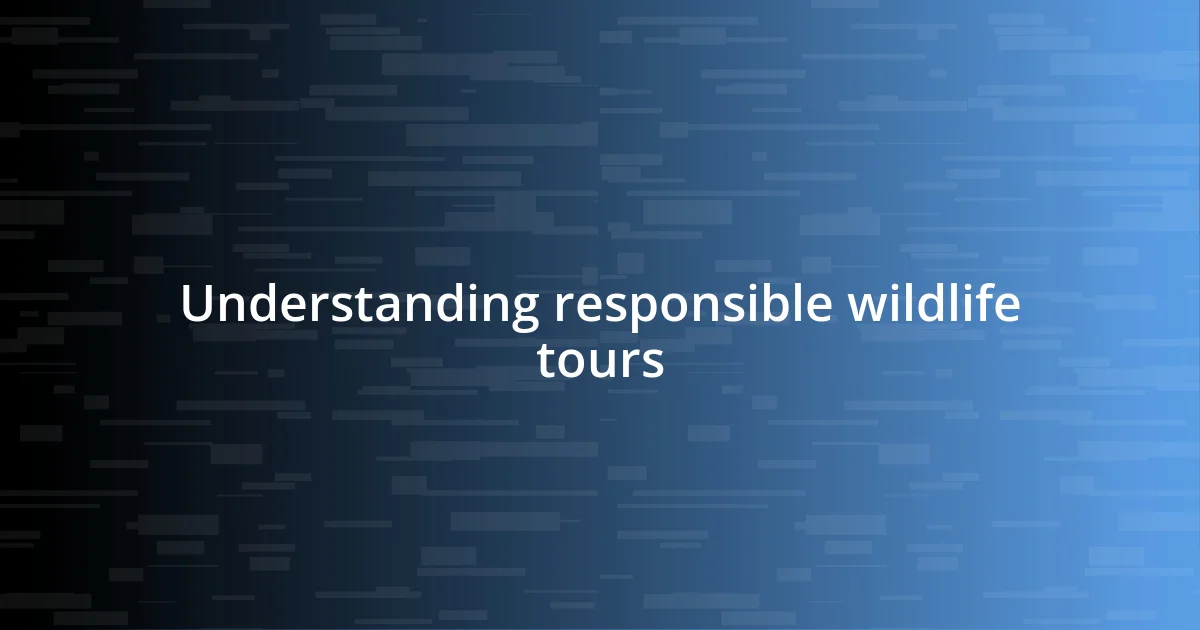
Understanding responsible wildlife tours
Absolutely, understanding responsible wildlife tours is crucial for both the experience and the preservation of nature. For me, a wildlife tour is not just about seeing exotic animals; it’s about fostering a deeper connection with the environment. Have you ever stood silently in a forest, witnessing a deer grazing calmly? It’s moments like these that remind me of the thin line we walk when enjoying nature.
When I first embarked on a wildlife tour, I was surprised to learn how much my choices could impact the ecosystem. For instance, opting for tours that respect animal habitats and minimize human interference makes a world of difference. Have you considered how your presence might affect the delicate balance of an ecosystem? Such revelations can truly transform how we approach these experiences.
Engaging with local communities is another critical aspect of responsible wildlife tours. I remember visiting a tribe that integrates conservation with their cultural practices. They shared stories of their connection to the land, and it made me realize that wildlife encounters can support local economies while preserving their heritage. Isn’t it inspiring to think that our tourism choices can contribute to both animal conservation and community well-being?
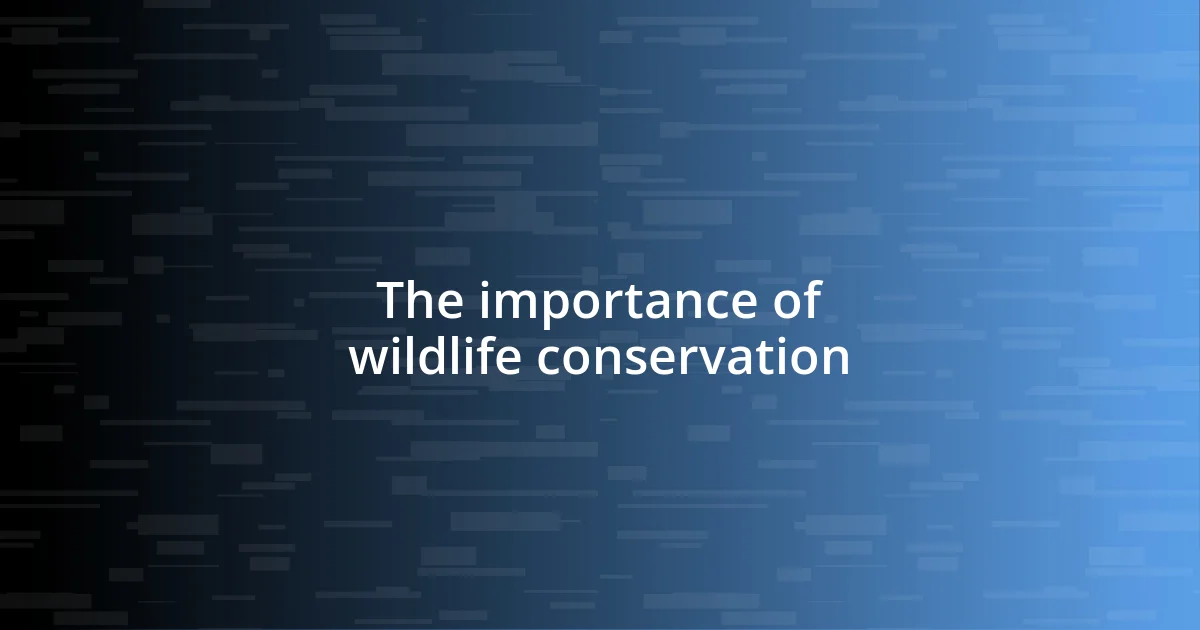
The importance of wildlife conservation
Wildlife conservation is paramount, as it safeguards biodiversity and ensures that ecosystems remain healthy. I’ve witnessed firsthand how preserving habitats can lead to more vibrant wildlife experiences. I’ll never forget the day I visited a sanctuary dedicated to rescuing endangered birds. The passion and dedication of the caretakers were contagious, and seeing those birds soar again was nothing short of magical.
Moreover, wildlife conservation plays a vital role in sustaining our planet’s health. Protecting species often means protecting their ecosystems, which in turn affects our own survival. For example, I learned that elephants are not merely majestic creatures; they are crucial for maintaining the grasslands and forests where they roam. Have you ever considered how the fate of one species can ripple through an entire ecosystem? It’s a reminder that every action—big or small—counts.
In addition, the link between conservation and climate change cannot be overlooked. I remember discussing this with a local guide while trekking through a rainforest. He explained how healthy ecosystems are more resilient to climate fluctuations. Isn’t it fascinating how conservation efforts can serve as a buffer against environmental challenges? When we prioritize the protection of wildlife, we’re not just saving animals; we’re paving the way for a more sustainable future.
| Key Fact | Impact |
|---|---|
| Biodiversity maintenance | Supports ecosystem health and resilience |
| Habitat protection | Ensures survival of species, which supports local economies |
| Climate change mitigation | Healthy ecosystems can adapt and withstand climate stress |
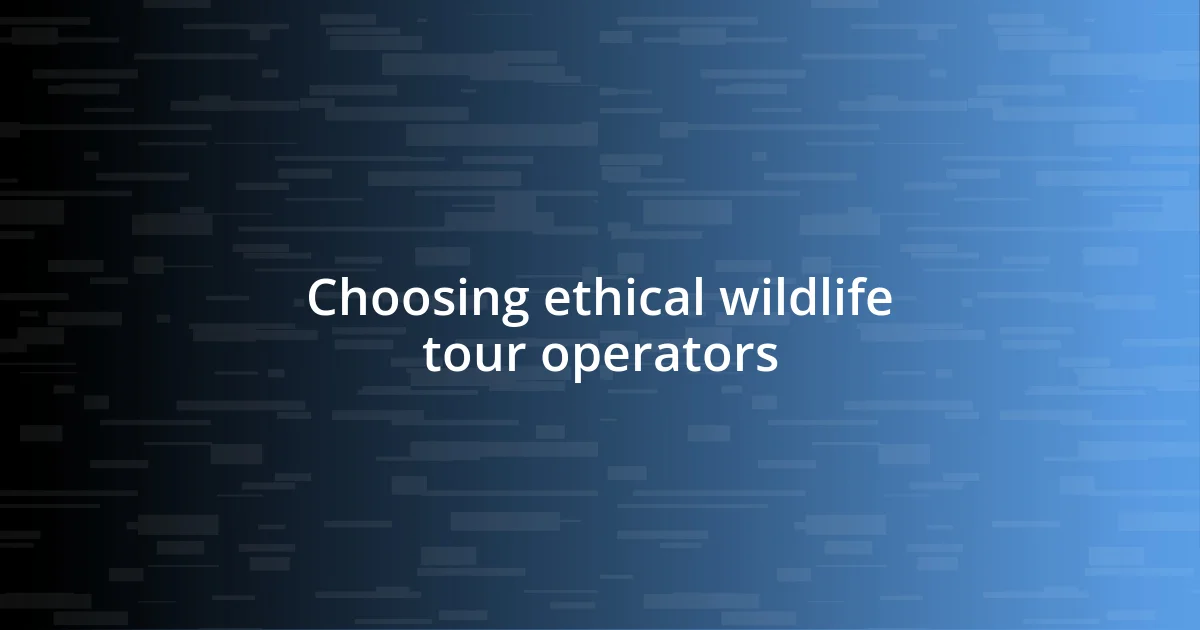
Choosing ethical wildlife tour operators
Choosing ethical wildlife tour operators can significantly enhance your experience while also benefiting the environment. When I plan my trips, I always look for operators that prioritize animal welfare and sustainable practices. I remember a tour where the guide explained how they monitor the animals with minimal disturbance. It felt reassuring to know that our presence was contributing to their preservation rather than disrupting their natural behaviors.
Here are some factors to consider when choosing a wildlife tour operator:
- Accreditations: Check for memberships in reputable wildlife conservation organizations.
- Local Community Involvement: Opt for operators that collaborate with and support local communities.
- Transparency: Look for operators who are open about their practices and impact on wildlife.
- Wildlife Interaction Policies: Ensure that the operator has strict protocols for avoiding direct contact with animals.
Consider these points, and you may find that choosing an ethical operator enriches your journey while making an important contribution to conservation.
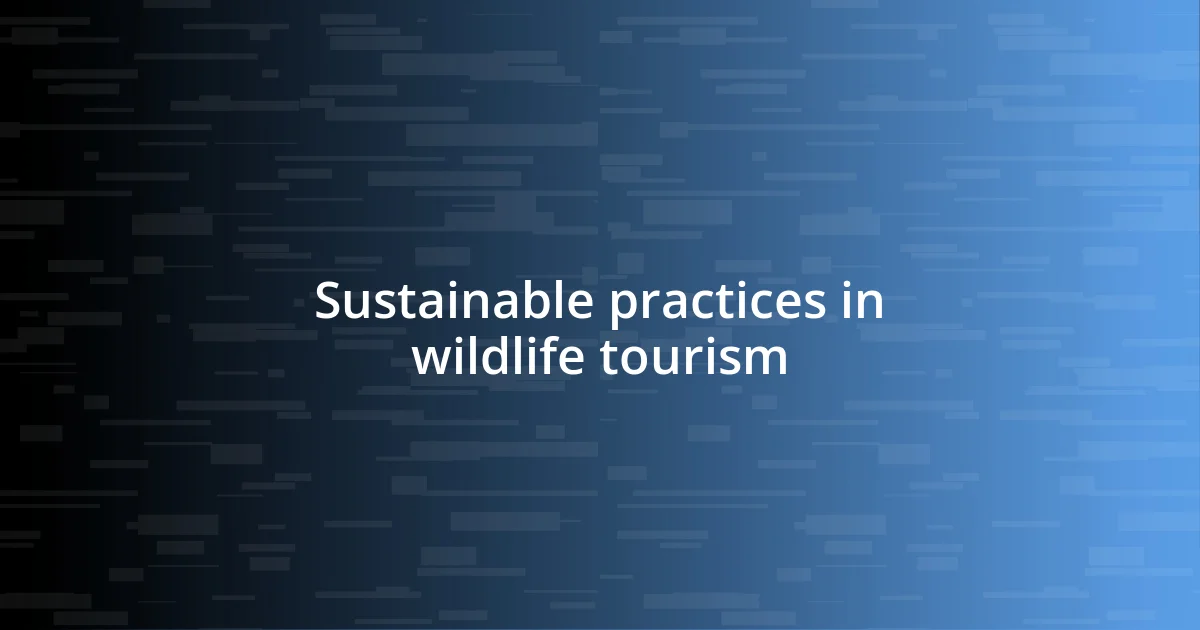
Sustainable practices in wildlife tourism
Sustainable practices in wildlife tourism are essential for both preserving nature and enhancing visitor experiences. I recall a time when I joined a responsible safari tour in Africa. The guide emphasized the importance of minimizing our footprints by sticking to designated paths, allowing the animals to roam freely. It’s astonishing how such simple actions can create a positive ripple effect on the environment.
Moreover, supporting local economies through wildlife tourism is a win-win situation. During one of my travels, I visited a community-run conservation project where tourists contribute to local livelihoods. Not only did I have the privilege of witnessing incredible wildlife, but I also felt a deep connection with the local culture. Have you ever considered how your travel choices impact the places you visit? It’s empowering to think that our decisions can help sustain both wildlife and communities.
Lastly, education and awareness are key components of sustainable wildlife tourism. I remember attending a workshop where experts shared insights on the delicate balance between conservation and tourism. It moved me to see so many travelers eager to learn how their visits could make a difference. Isn’t it inspiring how knowledge can transform our travel experiences into powerful acts of preservation? Engaging with local stories amplifies our understanding and appreciation of the natural world, fostering a deeper commitment to sustainability.
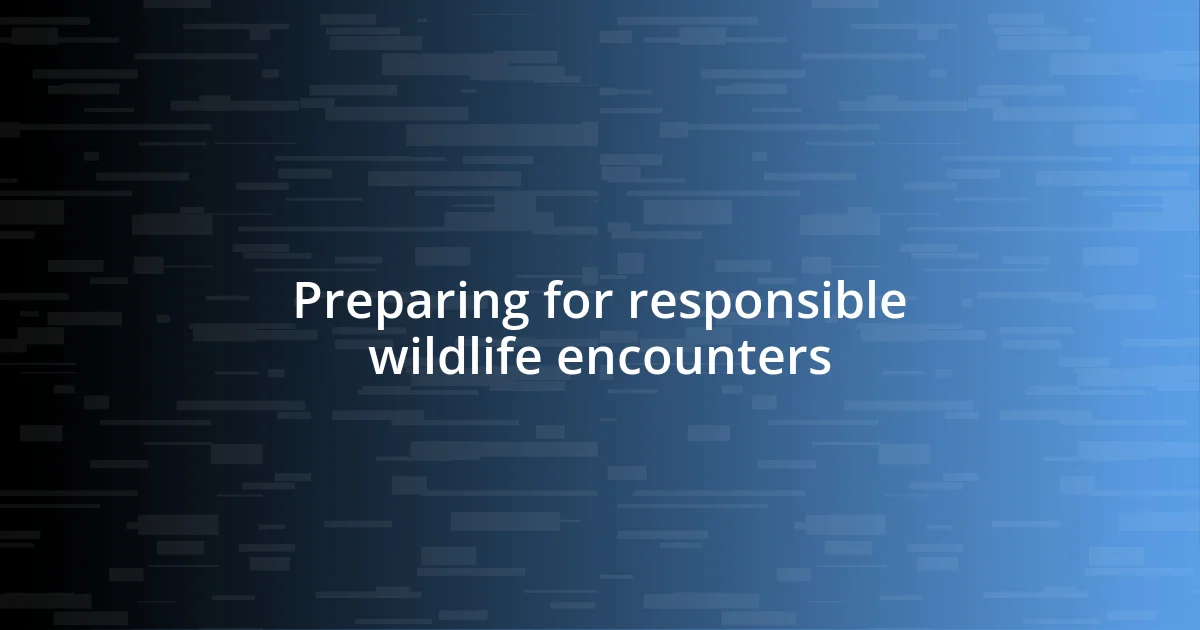
Preparing for responsible wildlife encounters
When preparing for responsible wildlife encounters, I find that research is my best friend. Before any trip, I dive deep into the specific animals I hope to see and their habitats. I once visited a rainforest where I learned about the behavior of howler monkeys. Understanding their routines made the experience utterly magical, as I realized we were witnessing their natural activities rather than interrupting their lives. Don’t you think it’s thrilling to step into an animal’s world with knowledge as your guide?
Packing the right gear is also crucial. I’ve learned to bring binoculars, a journal, and a camera that stays at a respectful distance. I remember being on a birdwatching tour where my binoculars helped me catch glimpses of vibrant species without disturbing their peace. The thrill of observing wildlife through a lens, not just a screen, fosters a deeper appreciation for their beauty, doesn’t it?
Mentally preparing for the unpredictability of wildlife is equally important. I recall a time in a national park when we waited for hours, only to be rewarded with a fleeting sighting of a majestic elk. There’s something special about embracing the unexpected; it heightens your senses and builds anticipation. Have you ever felt the rush of waiting for nature to reveal its wonders? Such moments remind us that the journey is as significant as the destination.

Tips for minimizing your impact
One of the simplest yet most effective ways to minimize your impact while enjoying wildlife tours is to adhere strictly to the “leave no trace” principles. I’ve had experiences in pristine environments where I was reminded that even small items, like a snack wrapper, can disrupt natural settings. Have you ever noticed how litter diminishes the beauty of a landscape? Each time I pack up my things after a visit, I feel a sense of responsibility, knowing I’m leaving the world as I found it.
It’s also crucial to respect wildlife by maintaining a safe and respectful distance. I remember a moment during a whale watching tour when we were reminded to keep a significant distance from the pods. Observing them from afar not only protected their natural behavior but also magnified the thrill of witnessing such magnificent creatures in their habitat. Isn’t it fascinating how seeing wildlife on their own terms can be far more rewarding than attempting a close encounter?
Finally, consider the impact of your choices on the local environment and community. When visiting a national park, I often choose to support businesses that prioritize sustainability. For instance, I once dined at a local eatery that sourced its ingredients from nearby farms. It felt wonderful knowing my meal helped promote local farming while being introduced to the region’s flavors. Don’t you think it’s empowering to know our purchasing decisions can create positive change?

Reflecting on your wildlife experience
Reflecting on a wildlife experience often triggers a mix of emotions for me. I can still vividly recall the serenity that enveloped me as I sat quietly in the African savanna, watching a family of elephants graze in the golden light of dusk. It struck me how intertwined we are with these magnificent creatures, and I found myself pondering: how often do we take the time to appreciate the natural world around us? That moment sparked a realization about the value of being present and aware during our wildlife encounters.
After such experiences, I’ve learned the importance of journaling my thoughts and feelings. I often jot down not only the sights and sounds but also the profound realizations that emerge during these moments. For instance, during a boat tour along a pristine coastline, I was moved by the sight of sea turtles gliding gracefully beneath the waves. Reflecting on the impact of our actions on their habitats, I wondered: what legacy am I creating as a visitor to these spaces? Writing helps me internalize these lessons, transforming fleeting memories into a lasting commitment to conservation.
Engaging in conversations about these experiences is another way I reflect. After returning home from a wildlife tour, I often host gatherings with friends to share stories and discuss what we’ve learned. I remember a particular evening filled with laughter and awe as we relived a close encounter with a playful otter. I encouraged everyone to think about what it means to be responsible stewards of the environment. Isn’t it wonderful how sharing our experiences can inspire collective action for wildlife conservation? These discussions not only enrich my own understanding but also foster a sense of community and shared responsibility.












